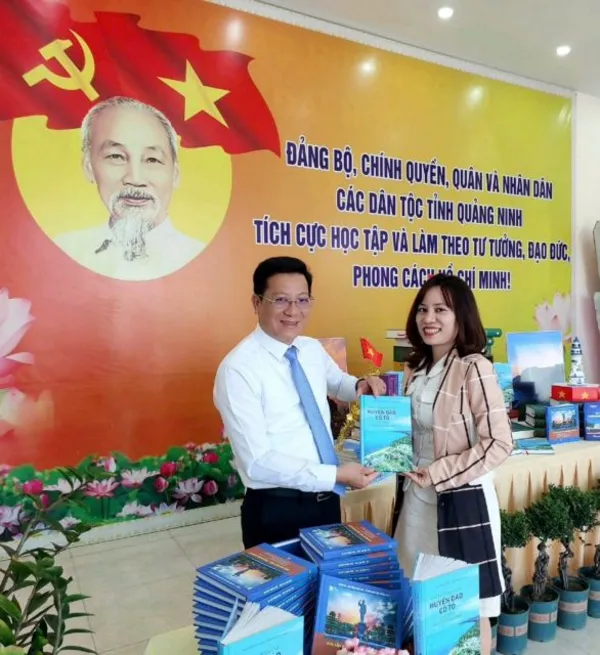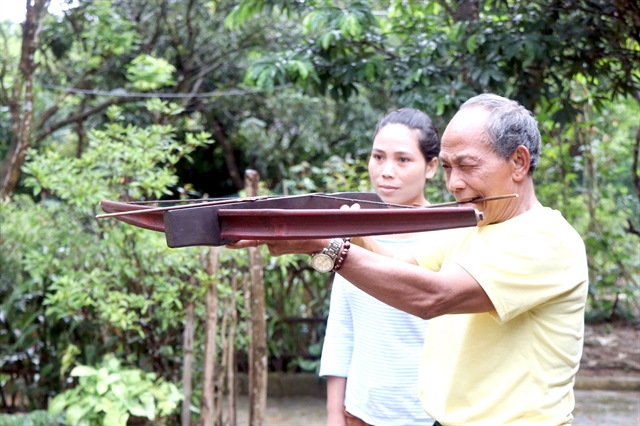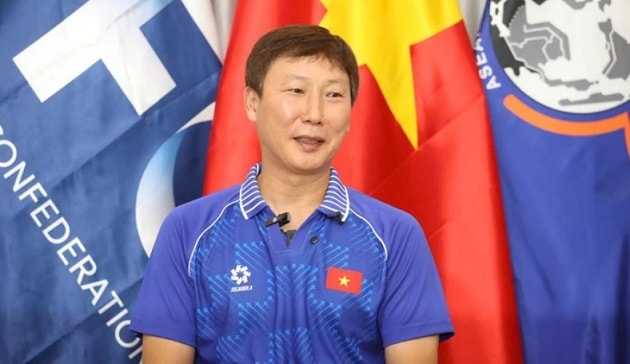

A man from the Tà Ôi people in Thừa Thiên Huế province loves crossbows. Hồ Xuân Thiện has won many crossbow shooting competitions. He used his crossbows in the war against the Americans and the French.

|
| READY, AIM, FIRE: Thiện (right) tutors one of his students, who is also a local villager, on crossbow shooting. — VNA/VNS Photos Đỗ Trưởng |
By Đỗ Trưởng
Whenever he has free time, Hồ Xuân Thiện, an elderly villager from the Tà Ôi ethnic group in the central province of Thừa Thiên Huế's A Lưới District, takes out a crossbow to practise shooting in the back garden.
The crossbows he carefully stores on the kitchen shelf are among his most precious possession as he's had them since he was very young.
They are also an important part of his many achievements in archery competitions, particularly those for ethnic minority groups in the central and Central Highlands regions.
Thiện is known across the province as a great archer and marksman of the Tà Ôi community due to his collection of medals in archery and certificates of merit in recognition of his contribution to the local and provincial sports games held annually to boost the unity among different ethnic groups.
Most recently, the old villager won a silver medal in archery at a large regional competition held in May last year. The competition was part of the Culture, Sports and Tourism Festival for ethnic minorities in the Việt Nam-Laos border region in the central and Central Highlands regions.
Visiting his house in Kleng Abung Village, besides his prizes and awards for sports, visitors will find many Government certificates of merit for his contributions to the victory of the national resistance war against the American invaders.
Thiện said that in the two resistance wars against the French and the Americans, the Tà Ôi people were always faithful to the Party ideology, wholeheartedly followed the revolution, and never be slavish to the enemies.
Carrying out the Party's and President Hồ Chí Minh's call for nationwide resistance in 1946, the Tà Ôi people stood up to use the weapons they had at their hands to fight the French.
"My people and I were all ready to respond to the national resistance and Uncle Hồ's call that we should use all kind of weapons in our hands to fight against the enemies and protect the revolutionary soldiers," said the old villager.
"I found that these were very meaningful goals to save the nation so I used my crossbows to fight against the invaders," Thiện proudly said.
Although now in his 80s, Thiện is still blessed with good vision. His eyes are still bright and sharp so he is always successful when shooting arrows.
He said he got a special passion for crossbows when his father passed down to him the secret of making and using them at a very early age.
"It often takes more than a month to make a perfect crossbow from selecting wood and bamboo to searching for natural jute fibres in the forest and braiding into the bow string which should be hard and durable enough to suffer from a lot of stretching," Thiện said.
The archer said a crossbow looks very simple but to make a high-precision weapon, it requires the craftsman to be very experienced, skilled and careful in evaluating the operation process of the crossbow so that when the user places an arrow on the body of the bow and presses the trigger, it creates a strong force enough to hit a target from 20-30m away.
Crossbows used to be an indispensable weapon for many generations of ethnic minorities in Thừa Thiên-Huế including the Tà Ôi families as men hunted for food and defended their villages, he explained.
They eventually became an important part of sporting events.
However, over time, crossbows and traditional archery have faded from the modern cultural lives of ethnic minorities due to imported culture and development.
To preserve and develop crossbow shooting in the locality, Thiện has participated in promotion programmes launched by the local culture and sports authorities.
He now runs training courses for young people in the village to teach them how to make and use bows and arrows and inspire them to take up archery.
Hồ Thị Thêm has been following one of Thiện's archery courses, and said she learned so much from him that she did well at some sporting games in A Lưới District.
"Thanks to the enthusiastic guidance of Thiện, we are day by day perfecting our shooting skills. The tutor is very willing to share with many young people like me the secrets of making crossbows with high accuracy. I wish the archery sport in our locality will develop to help preserve our cultural tradition,” said Thêm, also from the Tà Ôi group in Kleng Abung Village, Quảng Nhâm Commune.
The head of the A Lưới District's Culture and Information Office, Lê Thị Thêm, said Thiện was truly a valuable source of the cultural life of the locality and a nucleus to promote sports in the district.
"Over the years, A Lưới District has introduced crossbow shooting to sports games at commune and district levels to create a wide playground for people, and provide more opportunity for talents to emerge as well as help maintain the traditional sport of the ethnic community here," Thêm said. VNS
GLOSSARY
Whenever he has free time, Hồ Xuân Thiện, an elderly villager from the Tà Ôi ethnic group in the central province of Thừa Thiên Huế's A Lưới District, takes out a crossbow to practise shooting in the back garden.
An ethnic group is a community who share a religion, culture, race, language and traditions.
The crossbows he carefully stores on the kitchen shelf are among his most precious possession as he's had them since he was very young.
A possession is something someone owns.
They are also an important part of his many achievements in archery competitions, particularly those for ethnic minority groups in the central and Central Highlands regions.
Achievements are successful things that a person does.
Archery is a sport that involves shooting arrows using bows.
Thiện is known across the province as a great archer and marksman of the Tà Ôi community due to his collection of medals in archery and certificates of merit in recognition of his contribution to the local and provincial sports games held annually to boost the unity among different ethnic groups.
An archer is a person who shoots arrows.
A marksman is a person who is very good at shooting.
Visiting his house in Kleng Abung Village, besides his prizes and awards for sports, visitors will find many Government certificates of merit for his contributions to the victory of the national resistance war against the American invaders.
Contributions are things you give.
Resistance means acting against a strong force.
Invaders are people who come from one country to attack and occupy another country.
Thiện said that in the two resistance wars against the French and the Americans, the Tà Ôi people were always faithful to the Party ideology, wholeheartedly followed the revolution, and never be slavish to the enemies.
People who are faithful are loyal and devoted.
An ideology is a way of thinking and believing.
To do something wholeheartedly means to give it your all.
To be slavish means to try too hard to please someone else.
He said he got a special passion for crossbows when his father passed down to him the secret of making and using them at a very early age.
If you have a passion for something you love it so much that you do not worry about how much time or money you spend on it.
"It often takes more than a month to make a perfect crossbow from selecting wood and bamboo to searching for natural jute fibres in the forest and braiding into the bow string which should be hard and durable enough to suffer from a lot of stretching," Thiện said.
Fibres are stringy materials found in plants. Jute is a type of such fibre.
Braiding means weaving.
It something is durable it can last long and is tough enough to survive things like weathering.
The archer said a crossbow looks very simple but to make a high-precision weapon, it requires the craftsman to be very experienced, skilled and careful in evaluating the operation process of the crossbow so that when the user places an arrow on the body of the bow and presses the trigger, it creates a strong force enough to hit a target from 20-30m away.
A high-precision weapon is one that is made to be very accurate.
Crossbows used to be an indispensable weapon for many generations of ethnic minorities in Thừa Thiên-Huế including the Tà Ôi families as men hunted for food and defended their villages, he explained.
If something is indispensable it is absolutely necessary.
However, over time, crossbows and traditional archery have faded from the modern cultural lives of ethnic minorities due to imported culture and development.
Faded means disappeared.
He now runs training courses for young people in the village to teach them how to make and use bows and arrows and inspire them to take up archery.
To inspire someone means to make them want to go out and do something positive.
"Thanks to the enthusiastic guidance of Thiện, we are day by day perfecting our shooting skills.
Guidance is advice.
Enthusiastic means keen and interested.
The tutor is very willing to share with many young people like me the secrets of making crossbows with high accuracy.
A tutor is a teacher.
The head of the A Lưới District's Culture and Information Office, Lê Thị Thêm, said Thiện was truly a valuable source of the cultural life of the locality and a nucleus to promote sports in the district.
A nucleus is a central control place.
"Over the years, A Lưới District has introduced crossbow shooting to sports games at commune and district levels to create a wide playground for people, and provide more opportunity for talents to emerge as well as help maintain the traditional sport of the ethnic community here," Thêm said.
Maintain means “keep”.
WORKSHEET
State whether the following sentences are true, or false:
1. Just over a year ago Hồ Xuân Thiện won a silver medal.
2. Vietnamese people fought against both the Americans and the French.
3. It never takes more than a month for Hồ Xuân Thiện to make a perfect crossbow.
4. Tà Ôi people only defended themselves with crossbows, they never used them for hunting food.
5. Hồ Xuân Thiện’s home is in Quảng Nhâm Commune.
ANSWERS; 1. True; 2. True; 3. False; 4. False; 5. True.




